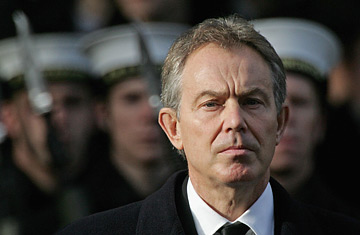
Britain's Prime Minister Tony Blair.
At a Camp David press conference on the weekend, Bush reiterated his support for his friend across the Atlantic and deplored Iran's "inexcusable behavior" in "the British hostages issue." The use of the word hostages was "utterly careless," says John Williams, who in June 2004 as Director of News for the British Foreign Ministry, was involved in moves to free eight British service personnel, also detained by Iran on a stretch of the Shatt al-Arab waterway. He argues that the British government must be seen to regard the current crop of detainees "as victims of a misunderstanding that could be resolved." That's a prerequisite for the kind of quiet diplomacy that prevailed back in the summer of 2004 when the eight were freed after three days.
Already British sailor Faye Turney and her colleagues from the HMS Cornwall have endured a longer detention with any chances for a quiet settlement eroded as they have been paraded for Iran's state media to utter words of contrition apparently scripted by their captors. An apology isn't likely to come from the British government. The HMS Cornwall was in the Gulf on a U.N. mandate to assist the Iraqi government in suppressing smuggling; the Ministry of Defence and the Foreign Office contend that its personnel had not strayed into Iranian waters; and the consensus in Whitehall is that saying sorry in such circumstances would store up more trouble for the future.
It's also far from clear that an apology would be sufficient to break the impasse. There is uncertainty about who ordered the capture of the sailors and marines by Iran's Revolutionary Guard, and whether the actions of the secretive elite force were sanctioned outside their powerful ranks. The National Council of Resistance of Iran, an exile organization opposed to the Tehran government — which the U.S. has nevertheless designated a front for terrorists — claimed on Mar. 31 to have information of a "meticulously concocted operation" to "win concessions from the international community and divert attention from [Iran's] nuclear projects."
Reports inside Iran suggest that hardliners are reveling in the controversy, while reformist factions are keen to bring about a resolution. British diplomats hoped that a planned meeting of key decision-makers in Iran would clarify Iran's position and yield a contact who has the power to deliver on the Iranian end of negotiations. Former Foreign Office News Director Williams suggests Ali Larijani, the Secretary General of Iran's Supreme National Security Council, may be one such figure. Larijani on April 2 told a British news program that Iran's "priority is to solve the problem through diplomatic channels" and now says bilateral contacts are in progress. Prime Minister Blair said today that "the next 48 hours will be fairly critical."
While awaiting such a breakthrough, Britain's Foreign Secretary Margaret Beckett has been careful to avoid tough talk. Her strategy earned a brickbat from John Bolton, the former U.S. Ambassador to the U.N. who told ABC News that "the softly-softly approach of the British Foreign Office simply convinces the Iranians that's all there is to it." "You can't just do low-key diplomacy when there's provocation," says Williams, but he adds, "You have to calibrate your rhetoric against the interests of the service personnel."
Only four days into the crisis, Blair warned Tehran of a "different phase" if diplomacy failed. That phase, if it comes, could involve a push for tougher and new sanctions. There is little appetite in Westminster or, according to opinion polls, among the British public, for any military intervention, or even for windy threats of reprisals. Sir Christopher Meyer, a former British Ambassador to the U.S., says that saber-rattling could be counter-productive. "Having taken your saber out of the scabbard, what do you do with it?" he asks. "There are a number of people out there calling for action but if you try to pin them down about what they mean, they haven't any clear ideas."
One man with an idea is Terry Waite, the former hostage and peace campaigner, who in 1981 as an envoy of the Archbishop of Canterbury successfully negotiated the release of British and Iranian Anglicans in Iran. Waite has offered to act as an intermediary between the British and Iranian authorities. He told TIME that he believes "as an independent humanitarian" he "could cut out the political bully-boy tactics." A Foreign Office spokesman says the British government is grateful for the offer. To quote another old saw, a friend in need is a friend indeed.
